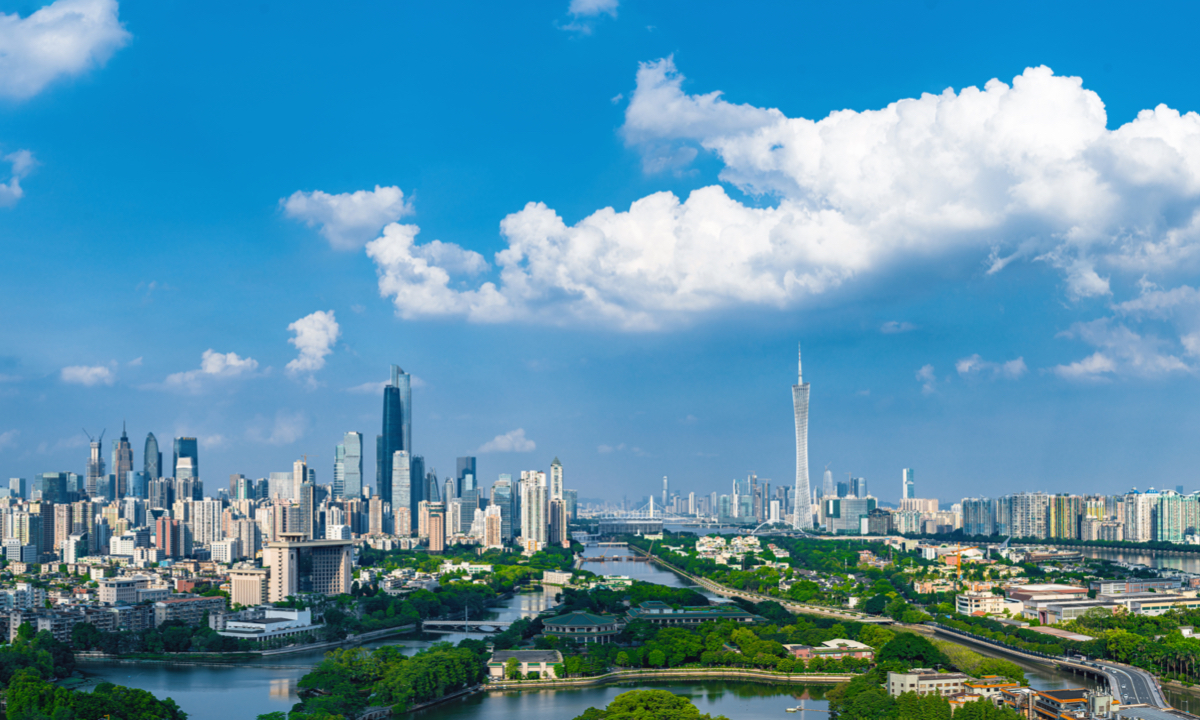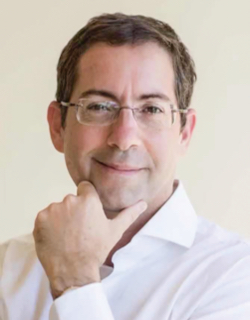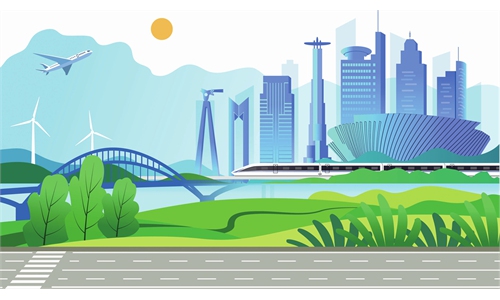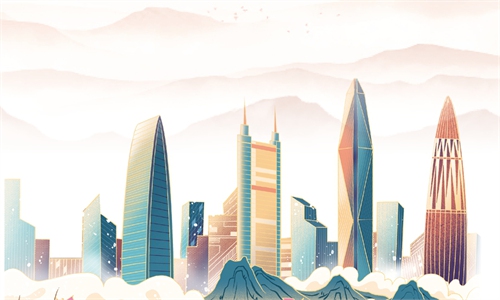Chinese model offers an alternative from Western model with more certainty and quicker decision-making

A scene of Guangzhou, Guangdong Province. Photo: VCG
Editor's Note:
For Chinese people, the past decade has been epic and inspirational. The country, under the leadership of the Communist Party of China (CPC) Central Committee with Comrade Xi Jinping at the core, has made great endeavors in boosting its economy, deepening reforms, improving the rights of its people and acting as a responsible global power.
"The Chinese model has proven itself in lifting hundreds of millions from poverty and therefore looks appealing to many. The Chinese model offers less uncertainty, fewer constraints and quicker decision-making," Gal Luft (Luft), co-director of the Washington-based Institute for the Analysis of Global Security, said in an interview with the Global Times (GT) reporter Lu Yuanzhi.
This is the 32nd article of the Global Times series about this special decade.
GT: How do you see China's development over the last decade? What changes have left you the deepest impression?
Luft: It is no secret that China's development has been the fastest and most impressive of any nation in modern history. It was not the kind of post-war boom we have seen in other countries and regions but an organic and responsibly choreographed boom. I visited China numerous times and each time I saw more prosperity, quality infrastructure and overall high level of optimism and dynamism in Chinese society. What impressed me the most was the success in the war on poverty, especially the connection of rural communities to modern transportation and communication systems and the sustainable manner in which all of this development has taken place. Many of the people of my generation still remember the feeling of hunger. But their children no longer know this sense. I have also been impressed with the achievements in the war on pollution. In my first visits to China there were days that the air was so polluted that one couldn't be sure if it's daylight or evening. Those occurrences are increasingly rare nowadays.
GT: In an interview, you said you wish any country, certainly in the West, have a "kind of leadership that China right now has in terms of its stability and execution power." What does this feature of Chinese governance mean for the world today?
Luft: The West, particularly the US, is trying to frame the international development as a choice between democracy and authoritarianism, with liberal democracy being presented as the most effective form of government and as the one most conducive to human prosperity and peace. The Chinese model challenges this narrative. Throughout the world developing countries are looking at China and at the West and are asking themselves which model is likely to deliver better results for their people. The Western-led system has been successful for quite some time, in part by relying on exploitation of poor countries, but there is now a growing sense that it is failing to deliver satisfactory results not only to their own people but also to poor countries trying to emulate the model. The Chinese model has proven itself in lifting hundreds of millions from poverty and looks appealing to many. The Chinese model offers less uncertainty, fewer constraints and quicker decision-making. But it is still not clear whether or not this model can be replicated outside of China with similar success. Time will tell.
GT: Western societies are also facing increasing challenges and uncertainties. Are there any advantages of China's governance that Western political systems can learn from?
Luft: The problem in most liberal democracies today is the ability of the government to execute long-term plans and fulfill promises to voters. Western democracies are belabored with webs of bureaucratic red tape which makes execution very difficult. We hear a great deal of rhetoric and promises which are not matched by deliverables. A major reason for the failure is hyper-partisanship and lack of policy continuity. The US, for example, changes between Republican and Democrat administrations produce sharp shifts in policy on almost every topic. Presidents regularly undo their predecessors' policies, including entering and withdrawing from international treaties. In other countries like the UK, Italy and Israel we have seen frequent leadership changes that bring to power leaders who were not elected by the majority of the voters, sometimes they are not elected at all but come to power thanks to arcane laws and bizarre political configurations. The Chinese system on the other hand may not offer the same right of dissent but it offers continuity, stability, long-term planning and execution. I'm not suggesting that the Chinese system is superior on every level, but that the weaknesses and dysfunctionalities exhibited by the democracies suggest that there is growing curiosity about alternative systems.
GT: Washington announced to hold the second Summit for Democracy in March 2023. What's your take on the US' attempts trying to contain China by creating cliques, based on the "democracy versus autocracy" stunt?
Luft: The attempt to divide the world according to democracies and autocracies is poorly conceived and self-defeating. As mentioned, too many democracies are a mess today and many autocracies get high grades for delivering for their people and improving people's lives. The pandemic has been an interesting test case. It was the first time in history in which all countries of the world regardless of their form of government were met with the same challenge at the exact same time. Interestingly, more than 80 percent of the people who died from COVID-19 lived in democracies. When it comes to the ultimate role of government - to defend its people - democracies fared poorly. US attempts to isolate China based on its non-democratic designation is both immoral as well as impractical. Immoral, because it fails to respect the thousands of years of political, social and cultural trial and error the Chinese people have experienced in the process of selecting the system best fitted to their unique needs. At the same time the West is trying to delete from the collective memory the dark history of slavery, colonialism, exploitation, wars, invasions and other form of abuse which brought the West to its present status, which is impractical, because no one like to be lectured by the US and its post-colonial Western allies and no one is willing to accept their self-proclaimed moral high ground. Leaders of developing countries have urgent needs. They want schools, roads, electricity and clean waters - not lectures about democracy or bizarre ideas about gender reaffirmation.

Gal Luft. Photo: Courtesy of Luft
GT: Today, the US political systems seem to be increasingly kidnapped by fierce partisan disputes. What is your opinion on the polarization of US politics? Can US-style democracy get rid of serving parties' self-interests and strive for the interests of the majority of Americans?
Luft: The divide between liberals and conservatives in the US is more cultural than political. The two camps agree on almost nothing because they hold very different cultural, ethical and religious worldviews. They do not agree on the role of government in people's lives and on how resources should be allocated. The gaps are unbridgeable and the country is in what can only be defined as a "cold civil war." Because there are more guns than people in the US and this dangerous situation could easily develop into a hot civil war. I'm not the only one concerned about the future of the American democracy. Polls show that roughly 50 percent of Americans feel that the country is on the path to a civil war within the next decade. One of the causes for this divide is what we call the "post-truth era." In the past, we used to say "you are entitled to your own opinion but not to your own facts." Today, we can no longer agree on basic facts, like what is a woman? what is marriage? when does life start? how many genders are there? etc. Without agreement on the most basic building blocks, society cannot function and politicians build on the hatred and fan the flames in order to reap short term political gains. I don't believe this is a resolvable problem. America was there in the 19th century and will probably have to go through similar ordeal. I guess it's part of its growing pains.
GT: The global energy crisis has stepped up, especially in Europe. Many European countries are worried about how to survive the winter. Many of their leaders accuse the US of fishing in troubled waters by selling energy to them, its allies, at much higher rates. What do you think of the result that even though following the US' strategy, Europe swallows the consequences of the energy crisis? What impact will the energy crisis have on US-EU relations?
Luft: The energy crisis in Europe is entirely the EU's own doing. For years Europe has been subscribing to a radical environmental agenda which prevented investment in reliable energy sources, turning its back not only to fossil fuels but also to clean and safe nuclear power. Then came the war in Ukraine which made the situation much worse. The US is benefitting from Europe's vulnerability, making it dependent on North American gas. The transition from Russian piped gas to American LNG imposes a de-facto tax on European industry because LNG will always be more expensive than piped gas. This means that energy intensive industries will migrate from Europe to the US and other places where manufacturing is cheaper. The deindustrialization of Europe, especially industrial powerhouses like Germany, France and Italy, is irreversible and could lead to massive economic dislocations and ultimately political instability throughout the continent. It is not clear to me that the US will be there for them to help pick up the pieces.
GT: The Ukraine crisis is at a critical juncture, and the risk of nuclear war cannot even be ruled out. Although many countries have called for a diplomatic solution to the dispute, there are clearly some forces that want the conflict to continue. What is your view about the Russia-Ukraine conflict? Will it become prolonged?
Luft: The war in Ukraine is a tragedy of epic scale that has already transformed the world in more than one way. The saddest thing is that it was entirely preventable had the leaderships on both sides better understood the cost of war and had they been more aware of the limits of their respective military and economic power. Now that we are where we are, the two sides - Russia and NATO/Ukraine - will have to reach a point of mutually hurting stalemate before they accept the inescapable reality that they cannot achieve their goals through military or economic pressure. Europe is facing a dark and cold winter which will no doubt weaken the resolve of its societies to continue in the current path. I suppose that at some point even the leaders - some of them unelected EU bureaucrats - will have to pay more attention to their peoples' voices and concerns. The streets are already flooded with protesters but this is not reported often by the media. Meanwhile the war is causing a great bifurcation of the international system - the West versus the Rest - in which the Global South is building its own institutions like BRICS and SCO as well as financial mechanisms that circumvent the dollar system. The Ukraine war is a catalyst for something that has been in the works for some years - an intensifying rebellion against the Western dominated post-WWII order and the status of the US dollars as reserve currency which left the Global South under-represented and deprived of equity. This is now changing, but change is never painless, and it will take quite some time for the pieces to rearrange themselves and create a new, hopefully more stable, balance of power.


